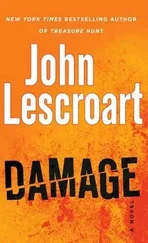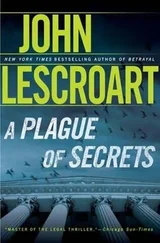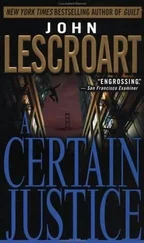“Am I late?” she asked sweetly.
I walked over and embraced her. “Where have you been? I’ve been worried sick.”
She didn’t get a chance to answer me, because the other men had come over and bombarded her with their stories of Lupa’s guilt and Paul’s publishing. So I went and opened a beer for her while she removed her coat and made herself comfortable. When the din had subsided somewhat, she offered her own tidbit: “I’ve just come from St. Etienne.”
The news, of course, had been in the paper that day, and I’d been a bit surprised that no one had brought it up before, but each had had his own personal matters, which were of some importance.
She continued. “That’s why I was late, and I’m sorry, but there was much to do. I’d gone yesterday to have lunch with Maurice—he’s so lonely, I feel I owe him at least that, Jules—and afterward, planned to go shopping with a friend. It was horrible, really horrible. I’d like that beer, please.” I handed it to her.
“Do you know what happened?” asked Henri. “I was there yesterday morning.”
“Only what you’ve read, I presume. The ammunition room blew up. The guards were killed instantly, so they don’t know whether someone succeeded in getting in.”
“Grisly,” said Georges.
“Very,” she agreed. “I should have been back last night,” she said to me, “but I stayed behind to help with the nursing.”
Fritz came to the door, knocked, and entered, closing the door behind him. “Excuse me,” he said, “but would you all mind stepping into the office for a moment. Monsieur Giraud has arranged a surprise for you.” So saying, he crossed to the tapestry and removed it, showing the door. I felt to make sure my pistol was available and, reassured, sat back in the chair. I took Tania’s hand while the others watched and waited for Fritz to open the door. As they filed in, Fritz seated them, and I spoke to Tania.
“Where is Anna?”
“She went to St. Etienne with me. She was feeling much better.”
“Well, I don’t understand why you didn’t leave a note with Danielle. We were both very much concerned.”
“But, Jules,” she said, “I did leave a note. Out on the coffee table outside where she always serves me breakfast.” She smiled and patted my hand. “I know all about it. When we returned and discovered the house locked up, I went to your place and found Danielle, and she told me the whole story. It had been chilly yesterday morning, and she thought I’d rather take my coffee inside, so she never went out to the table. Come,” she said, standing, “the others are waiting. What’s the surprise?”
I shrugged nonchalantly. “If I tell you, it won’t be.”
Fritz had me seated to the left of Lupa’s desk, facing the others. Tania sat opposite me, and next to her, Paul, then Henri and Georges, with Henri on my far right. Fritz exited. No one spoke. In another moment, the door opened again, and Fritz asked me to help him bring in the cases of beer. I went back out to the apartment, and he closed the door behind me.
Lupa came out from down the hall and motioned me quiet with his finger to his lips. “The table?” he whispered.
“Only that small depression—looks like a spiderweb.”
He smiled. “Yes, I thought I remembered that. Satisfactory. It closes the circle. I’ll be right in.”
Fritz and I took the beer inside and set it behind the desk. I sat again and Fritz walked out, leaving the door ajar.
“What’s the surprise, Jules?” asked Paul. “The tension is killing me.”
“Tension rarely kills,” said Lupa, appearing in the doorway. “People kill.” He closed the door behind him. The lock clicked into place.
They were all on their feet. Lupa ignored the commotion, crossed to his desk, and sat. As he reached for a beer, the noise died down.
“What’s the meaning of this, Jules?” asked Georges, but they all shared the sentiment.
“Please, please,” Lupa admonished, opening his beer and pouring, “let us be civilized. I’ve arranged it, through Monsieur Giraud, that all of you would be here tonight. Last week, one of your friends was killed in our presence. The police have witlessly concluded that I am the guilty party, and this is not the case. The purpose of this little meeting will be to expose the killer, which is one of you.”
“But you’re the killer,” Henri exploded.
“No, sir,” Lupa replied. “I am not. Most assuredly.”
“I won’t stay,” said Paul.
“Oh, but you will. The door is locked. Besides, what have you to fear? If you are innocent, no harm will come to you. If not, well . . .”
“I’ll tell you what we have to fear,” said Georges. “We have you to fear. Last week you killed Marcel and that inspector. Tonight you might kill any one, or all, of us.”
“Oh, tut, sir.” He looked around. “Please, all of you, relax. Would any of you care for more beer? I nearly forgot to have it brought in.”
There were no takers.
He leaned back. “Now, then, where to begin? We may as well get at the facts.” He sighed, then drank, then began.
“The rumors you have heard about this case being an international affair are perfectly true. Since I will be long gone, and certainly in no danger from any of you, I can afford to tell you this. I am an Allied spy.”
He paused for the words to sink in. “Now, then. I was sent here just after the war broke out to try and learn the identity of one of Europe’s most dangerous minds and, having done so, to stop him.
“I’d been having no luck until last Wednesday, when Monsieur Giraud fortuitously invited me to your weekly gathering. The person I sought undoubtedly knew me, since I’d chased him through Eastern Europe for several months preceding my move here to Valence. He kept eluding me precisely because he knew who I was, though I changed my identity and papers in every location. Finally, when I learned that he’d come to Valence, I decided to come here as a worker, find a job, and stay hidden and anonymous until he acted or made a mistake. However, nothing happened for so long that I began to fear he’d left.
“In desperation, I accepted Monsieur Giraud’s offer to be seen in public. My luck was extraordinary. The man I was trailing was at that first gathering. Of course, not knowing him put me at a distinct disadvantage, which he decided to capitalize on immediately. He tried to kill me.”
He paused to look at the assemblage. “Of course, you’re probably wondering why he chose that drastic method when, in the past, he’d simply run.”
“I was wondering that,” said Paul, dryly.
“The answer is, as my father would say, elementary. He had to remain in Valence until some other job was completed. Last week I learned and yesterday it was verified that that job was the destruction of the St. Etienne Arsenal. So he had to stay, and he had to elude me. When, by mistake, he killed Monsieur Routier, he put me hot on his trail again, for the first time in nine months.
“I resolved not to lose him again, and I haven’t. Killing Routier was an act of panic, provoked by seeing me. If he’d kept calm and done nothing, he would have succeeded in his mission at no danger to himself. Monsieur Routier, by the way, since he is dead and the knowledge can do no harm, was himself an agent of the French government, seeking this same man.”
A murmur ran like a current through my friends—“What? Marcel? C’est impossible! ”
Lupa continued, oblivious to their reactions. “I surmise that at the time of his death, Routier’s cover was still intact, which means that his espionage connections were still unknown, even to his murderer. That much by way of prologue. Are you sure none of you will have more beer?”
Читать дальше












